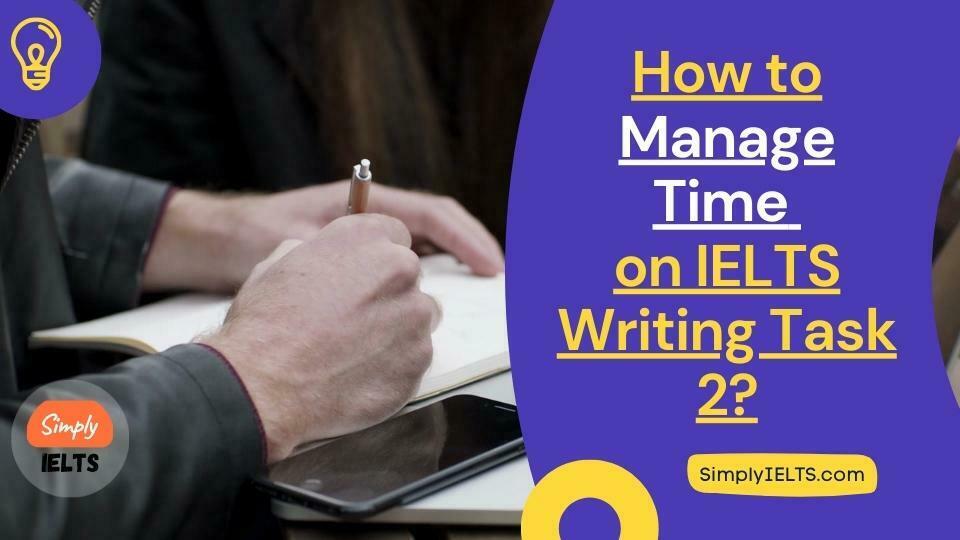How to Manage Time on IELTS Writing Task 2?

The IELTS Writing component sounds very simple. “Just write two things in an hour? I could do it in no time!” Only when the students start practising essay writing, do they hit the brick wall. “How can I write a whole essay in just 40 minutes? How to manage time?” is the first question that pops in their head.
I have seen many students lose confidence as it dawns upon them that they don’t know how to complete the IELTS essay in 40 minutes.
This blog has all the tips and tricks I tell my students to write the best essay they can in the period.
The simplest way to manage time on IELTS essays is to divide the essay into simple paragraphs and standard structures. And then divide time frame of 40 minutes to complete those tasks. Further, practise the breakdown and tweak it to your writing and thinking speed.
Make sure that the whole process does not take more than 40 minutes; the time given to write IELTS Writing Task 2.
The age-old method of writing an essay
How many times have we heard our secondary school teachers tell us “think, write, and edit is the way to go”? Alas, it is this very technique that kills our time in the exam. In theory, this process is very simple. First, think of the points you want to mention in the essay.
Then write the essay – from introduction to end paragraph. Finally, edit the essay. Check for grammar, sentence structure and make sure that the points make sense.
Problems with the traditional way of writing an essay
Very frankly the method is not that bad for writing IELTS essays, letters or reports. However, it is best suited for writers who believe in it and persist with it for a long time. In simple terms, most IELTS students cannot deal with it if they are looking for faster results.
Problem 1: Too much time wasted in planning
So, most of the IELTS students, who wish to adopt this method, realise that they take too much time to think about the topic. And then they are not left with much time to write.
Specifically, this happens as test-takers feel they will be able to score well only if their essays have big words and sentences. So, they wait and wait until they realise that they must complete the writing task.
Problem 2: Mixing the three tasks: think, write and edit
Another problem is that even if students finish thinking and start writing the IELTS essay, they constantly feel an urge to replace the words or sentences that they have used with a bit sophisticated ones.
As a result, they start editing their essays while writing. Such actions lead to confusion and hamper test-takers’ time to complete the essay.
Solution: modified method
Step 1: Breakdown of the IELTS essay task
Now instead of attacking all whole essay, what if we can attack the smaller tasks. We must break down the 40 minutes given to us by IELTS into smaller chunks. So, let’s say we must include the following components in an IELTS essay.
- Introduction
- Body Paragraphs
- End paragraph
Now instead of focusing on the whole essay task, we will focus only on writing one of the components at a time. When we attribute time chunk to each of these smaller tasks, we will successfully finish thinking, writing and editing in the given time frame.
So, from My experience, I can say that allotting time limits to these smaller tasks as follows will help you immensely.
- Write the Introduction: 5 minutes.
- Think and write Body Paragraphs: 25 minutes.
- Write End Paragraph: 5 minutes.
- Check and Edit Essay: 5 minutes.
If you calculate the whole time taken, it will amount to 40 minutes.
Step 2: Practice the Breakdown.
Students must understand that they have to think and write the body paragraphs in the 25 minutes allotted. On average students should take five minutes to come up with the points.
The essay needs 4 points and 2 examples, which should be thought and jotted down in those five minutes. It would take a student with average English proficiency around 10 minutes to write 2 points and 1 example in each paragraph. The key to using this breakdown is practice.
Write as many IELTS essays as possible before you apply for the exam. This will allow you to get the hang of the breakdown. You may realise that you need 10 minutes to plan your points but only 15 minutes to write the body paragraphs.
Such individual adjustments are only possible when the student has used this method multiple times.
Step 3: Write in Flow.
The most important thing to remember while writing for IELTS is to write in a flow. Often students start writing the body paragraph and come up with an even better idea once it’s done. This leads to the students erasing the paragraph and writing all over again.
This is a waste of time because IELTS does not care about the quality of points as long as they make basic sense. The student should focus on the quality of communication instead of intelligent points. It is okay to make mistakes in the first draft of the essay.
That’s why we have kept 5 minutes, in the end, to make edits and fix spelling mistakes. This will also help you check the flow of the essay and add connectors wherever required.
Conclusion
After teaching IELTS to more than 3500 students, we believe that most of the students are comfortable with this method. Ensure that you plan your essay well. Understand, we can write well only if we plan well. Also, don’t shy away from further modifying this technique to suit your writing style.





Responses